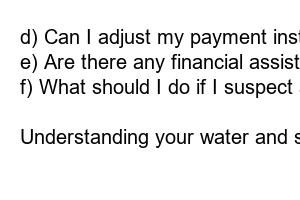상하수도 요금 조회
Title: Simplifying Your Water and Sewerage Bill Inquiry
Introduction:
Are you perplexed by your water and sewerage bill? Do you find it challenging to comprehend the charges and usage details? Worry not, as this blog post aims to simplify the process of understanding your water and sewerage bill. We will guide you through the key aspects, give you tips on saving money, and answer frequently asked questions.
1. Understanding Your Water and Sewerage Bill:
Your water and sewerage bill comprises various components such as usage charges, service fees, and taxes. It is essential to comprehend each aspect to better manage your expenses. Usage charges are calculated based on the amount of water consumed, while service fees cover maintenance and administration costs.
2. Calculating Water Consumption:
To calculate your water consumption, subtract the previous meter reading from the current one. A single unit of water is usually equivalent to 1000 liters. By keeping track of your usage, you can identify any sudden spikes or abnormal patterns, assisting you in detecting leaks and reducing wastage.
3. Reducing Your Water Consumption:
Conserving water not only benefits the environment but also lowers your utility bills. Simple practices such as fixing leaky faucets or opting for water-saving appliances can make a significant difference. Additionally, make it a habit to turn off faucets while brushing your teeth or shaving, and consider installing a water-efficient showerhead.
4. Analyzing Sewerage Charges:
Sewerage charges are typically calculated based on your water consumption. However, if you believe that a significant portion of water is not entering the sewerage system, you can request your utility provider to review your account. By making sure you are accurately charged, you can avoid unnecessary expenses.
5. Questions About Water and Sewerage Bills:
a) How often are water and sewerage bills generated?
Water bills are usually generated every month, while sewerage bills might be issued less frequently – every quarter or semi-annually.
b) Can I dispute any charges on my bill?
Yes, in case of billing discrepancies or incorrect charges, you have the right to dispute them. Contact your utility provider, present your case, and seek resolution.
c) How can I switch to paperless billing?
Many utility companies offer paperless billing options. Visit their website or contact customer support to sign up for electronic bills.
d) Can I adjust my payment installment plan?
If you are facing financial difficulties, most utility companies are willing to work with you. Contact their customer service and discuss the available options for adjusting your payment plan.
e) Are there any financial assistance programs available for low-income families?
Yes, many utility companies offer financial assistance programs for eligible low-income families. Reach out to your utility provider to learn more about the application and qualification process.
f) What should I do if I suspect a water leak?
If you suspect a water leak, check all visible pipes and fixtures for any signs of leakage. If the issue persists, contact a professional plumber for assistance.
Summary:
Understanding your water and sewerage bill is crucial for effective usage management and cost control. By familiarizing yourself with the various components of the bill, calculating water consumption, and implementing water-saving tips, you can make informed decisions and save money. Remember, if you have any questions or concerns about your bill, reach out to your utility provider for assistance.

